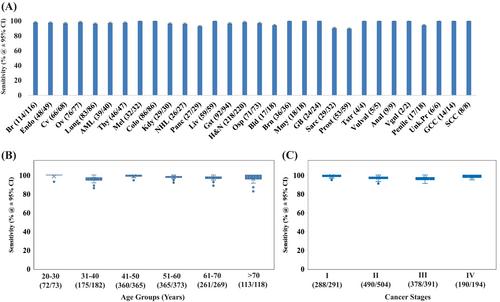Development of a Serum Metabolome-Based Test for Early-Stage Detection of Multiple Cancers
Abstract
Background
Detection of cancer at the early stage currently offers the only viable strategy for reducing disease-related morbidity and mortality. Various approaches for multi-cancer early detection are being explored, which largely rely on capturing signals from circulating analytes shed by tumors into the blood. The fact that biomarker concentrations are limiting in the early stages of cancer, however, compromises the accuracy of these tests. We, therefore, adopted an alternate approach that involved interrogation of the serum metabolome with machine learning-based data analytics. Here, we monitored for modulations in metabolite patterns that correlated with the presence or absence of cancer. Results obtained confirmed the efficacy of this approach by demonstrating that it could detect a total of 15 cancers in women with an average accuracy of about 99%.
Aims
To further increase the scope of our test, we conducted an investigator-initiated clinical trial involving a total of 6445 study participants, which included both cancer patients and non-cancer volunteers. Our goal here was to maximize the number of cancers that could be detected, while also covering cancers in both females and males.
Methods and Results
Metabolites extracted from individual serum samples were profiled by ultra-performance liquid chromatography coupled to a high-resolution mass spectrometer using an untargeted protocol. After processing, the data were analyzed by our cancer detection machine-learning algorithm to differentiate cancer from non-cancer samples. Results revealed that our test platform could indeed detect a total of 30 cancers, covering both females and males, with an average accuracy of ~98%. Importantly, the high detection accuracy remained invariant across all four stages of the cancers.
Conclusion
Thus, our approach of integrating untargeted metabolomics with machine learning-powered data analytics offers a powerful strategy for early-stage multi-cancer detection with high accuracy.
Trial Registration: Registration No: CTRI/2023/03/050316


 求助内容:
求助内容: 应助结果提醒方式:
应助结果提醒方式:


